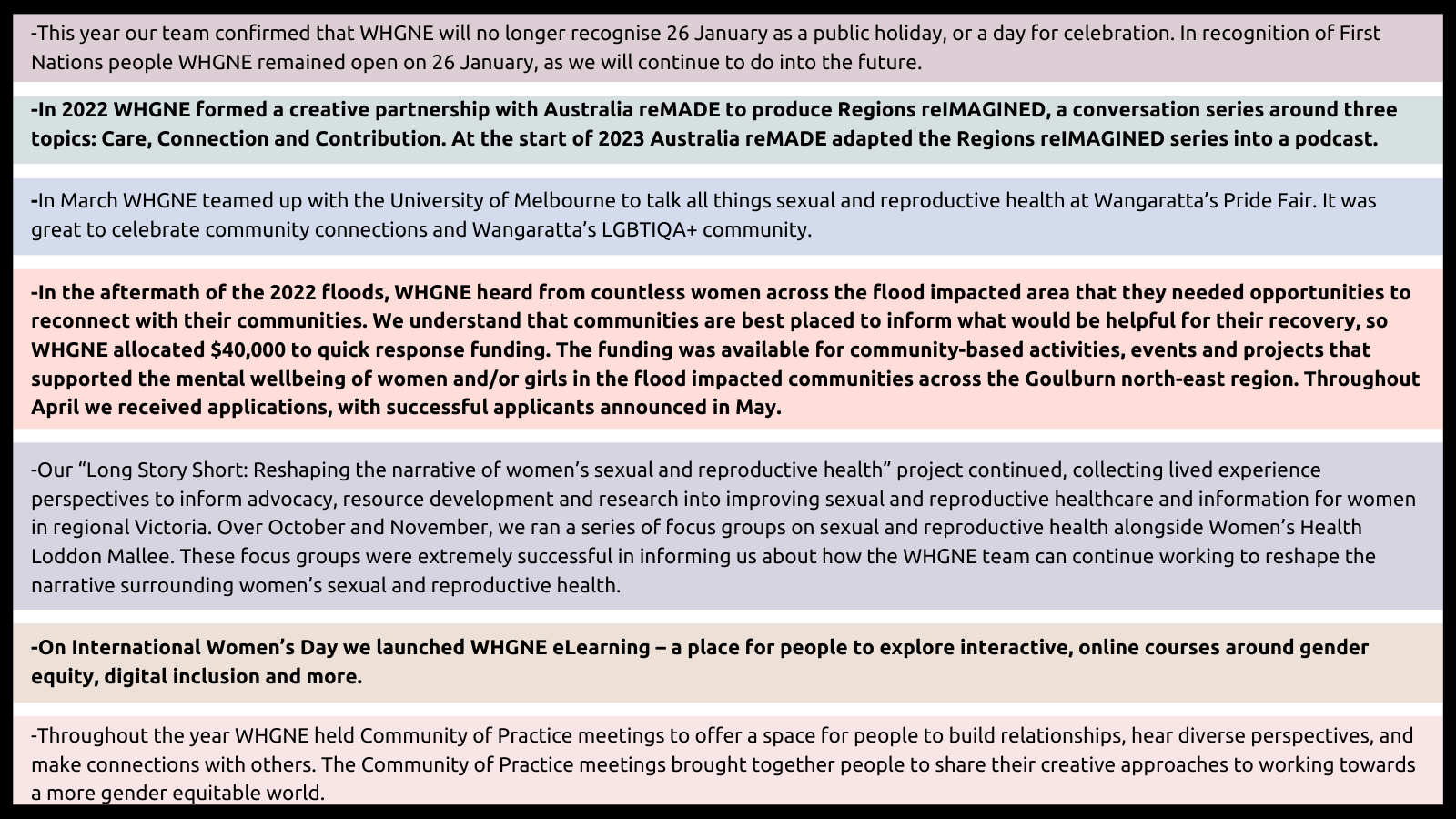As we come to the end of another year, it is time to look back, reflect and plan for the year ahead. There have been both highlights and hurdles in the pursuit of gender equality and social equity throughout the year. Let’s look back on some of the influential events of 2023, and how they might inform WHGNE’s work in 2024:
One of the defining periods of 2023 was the Voice Referendum and conversations around healing and Reconciliation. The Voice Referendum result was a disappointment to us here at WHGNE, who believe that we must make space to centre the voices of First Nations communities to achieve equity and justice in this country. It is our sincere hope that all of us living in Australia will collectively renew and support efforts to find that space and support Indigenous-led initiatives towards Reconciliation, through avenues like Treaty legislation, as well as new innovative ideas.
This year also saw an increase in commitment from the Federal and State Governments to develop and implement climate forward policies, acknowledging the importance of Indigenous leadership in this space. WHGNE would like to see sustained and meaningful action in 2024 towards meeting emissions targets, safeguarding remote, rural and regional communities from the impacts of climate-based emergencies and continued moves towards effective, preventative and properly resourced climate policy.
Moving into 2024, WHGNE will reiterate, through our work and our advocacy, the importance of viewing climate policy through a gender and rural lens. This message will build on our recent research into care and disaster, as well as discussions around the mental health and wellbeing impacts of climate-based emergencies on women in rural communities and the imperative to consider climate-resilient housing in disaster-prone areas. 2024 will also see a focus on the benefits of local food systems, as we work collaboratively with stakeholders and communities in northeast Victoria. WHGNE is preparing to respond to the recently released National Climate Health Strategy, which we contributed to in the consultation phase – another space to watch in 2024.
2023 has been an impactful year for gender equity action in our region and beyond. While there are factors which show that, in many meaningful ways, we have a long path towards true gender equality in this country – the devastating rates of gender-based violence and femicide or the ongoing poverty gap disproportionately disadvantaging women, for example – there is also evidence of collective efforts to improve the lives of women, girls and gender diverse people across our region and beyond, which highlight the need for continued action and the potential of strengths-based solutions.
This year saw a focus on prioritising women’s health in the Victorian budget, which has included the opening of new sexual and reproductive health hubs – including one just announced in Mitchell Shire for the coming year. The Gender Equality Act continues to drive policy change within defined entities and Victoria welcomed the second woman ever in the role of State Premier, Jacinta Allan. On a national level, we saw Ged Kearney lead the Federal Government’s ongoing effort to address medical misogyny through the National Women’s Health Advisory Council.
Regionally, WHGNE’s 16 Days of Activism campaign mapped the collective prevention activities in Goulburn North East, demonstrating the commitment and drive to foster an equitable, just Victoria – 2024 will be an important year for advocacy to implore decision-makers to invest the time, energy and resources necessary to drive forward gender equality and eliminate gender-based violence through prevention activities.
As the year comes to a close, we have collated some of the events and outcomes at WHGNE over the last 12 months:

